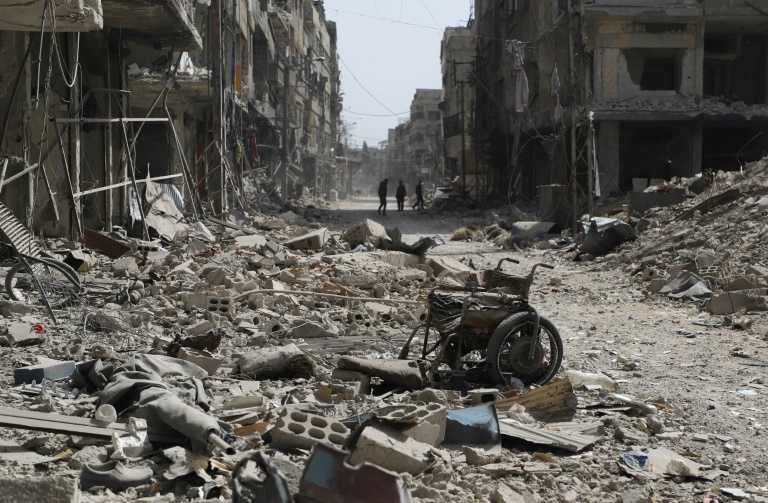Syrian rebels and civilians gathered in rubble-strewn streets early on Saturday, awaiting evacuation from the penultimate opposition-held pocket of Eastern Ghouta.
Faylaq al-Rahman, the Islamist rebel group that controls the area, agreed to pull out in exchange for an end to nearly five weeks of devastating bombardment by the government and its allies.
The departure of thousands of fighters and civilians from the southern part of the onetime rebel bastion had been scheduled to start at 9 am (0700 GMT) but by late morning the buses had yet to arrive, an AFP correspondent reported.
Dozens of fighters, their relatives, and other residents waited out in the open in the bombed-out streets of Arbin, one of the towns included in the deal.
It was the first time in weeks that so many people were seen outside. Relentless shelling and air strikes had made it too dangerous to venture out of basement shelters, even to find food.
Many had their bags already packed in readiness for leaving their hometowns and heading northwest to Idlib, the last province still largely under opposition control.
In the nearby town of Zamalka, also included in the deal, ambulances were seen preparing to transport the sick and wounded for treatment.
In addition to Zamalka and Arbin, the agreement includes Ain Terma and parts of the Jobar district — all controlled by Faylaq al-Rahman.

Rubble litters the sreets of the rebel-held Eastern Ghouta town of Zamalka following regime air strikes on March 22, 2018
Eastern Ghouta was once the opposition’s main bastion on the outskirts of Damascus, but the government has recaptured more than 90 percent of it through a mixture of military pressure and evacuation deals.
The agreement with Faylaq came after a similar deal with the hardline Ahrar al-Sham rebel group, which saw the Ghouta town of Harasta emptied of rebel fighters on Thursday and Friday.
More than 4,500 people, including over 1,400 fighters, left for Idlib, state television reported.
Talks are under way over the fate of the last rebel-held pocket of Eastern Ghouta around its main town of Douma, which is controlled by the Jaish al-Islam rebel group.






